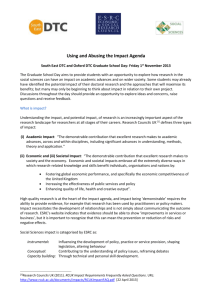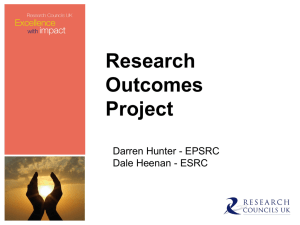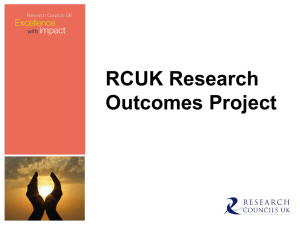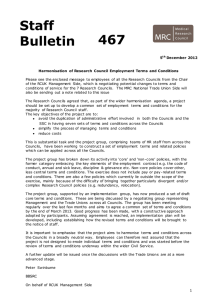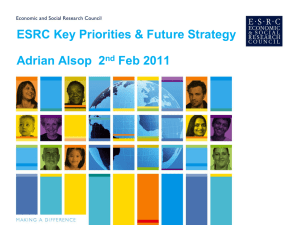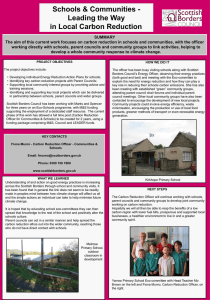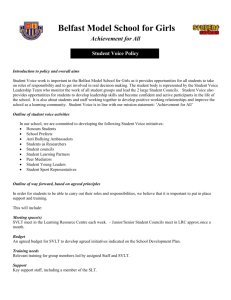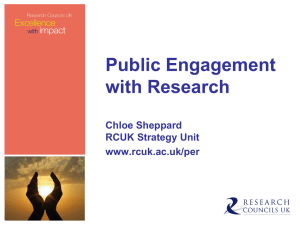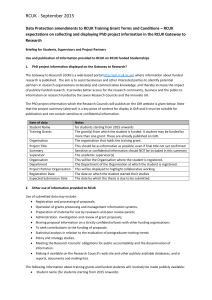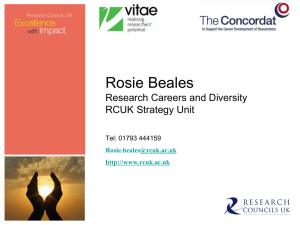Impact on the research dance floor Line dance, tango or ceilidh?
advertisement
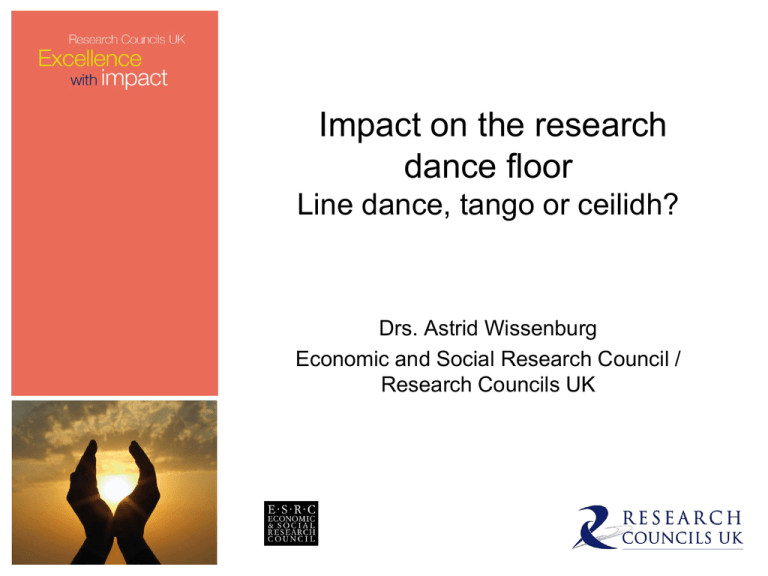
Impact on the research dance floor Line dance, tango or ceilidh? Drs. Astrid Wissenburg Economic and Social Research Council / Research Councils UK Research Councils UK • Partnership of the UK’s seven Research Councils. • Annually invest around £3 billion in research. • Support research that contributes to a productive economy, healthy society and a sustainable world. • Work with a range of partners to support exchange of knowledge from the research base into the private, public and third sectors • Establishing an ongoing dialogue between the research community and the public, to ensure society can benefit more fully from the outputs of research Research Councils UK & Impact • Committed to excellence with impact: this means continuing to invest in the best research, people and infrastructure, whilst aiming to enhance the impact of that funding on society. • Recognise that the research we fund has both academic and economic and societal impacts, i.e. The demonstrable contribution that excellent research makes to society and the economy by: – Fostering global economic performance, and specifically the economic competitiveness of the UK – Increasing the effectiveness of public services and policy – Enhancing quality of life, health and creative output Pathways to Impact Instrumental Influencing the development of policy / practice Shaping behaviour Altering legislation Conceptual Shifts our understanding of policy/practice Reframing debates Pathways to impact vary Impacts range from instrumental to more subtle Capacity-building Technical / professional skills development Cultural change •Increased willingness to engage in knowledge exchange activities •Changed mindsets Enduring connectivity •Establishment of enduring relationships – indicator future impacts What steps lead to impact? Example Birth Cohort Study Scoping and specifying the research agenda Social scientists Medical researchers Government depts. Business sector Third sector Teachers etc Data and privacy activists Parents ‘General’ public Commissioning the research Social scientists Medical researchers Government depts. Managing the research Research use and impact Participants Social scientists Medical researchers Government depts. Business& third sector Teachers etc Data and privacy activists Parents ‘General’ public Media Who is who? Configurations of engagement: Line dance – – – – Show and follow One size fits all Imitation Not connecting Tango • • • • Close 1-1 relationship Trust Party for 2 Precision Ceilidh • • • • Complex Extendable Flexible Varying configurations Engagement in practice – what works? • Established networks & relationships with research users • Awareness of the policy & practice context • Users involved at the outset and throughout (CoProduction) • Early and well-planned user engagement and knowledge exchange strategy • Accessible findings (language, format) • Credibility - portfolios of research activity that build reputations with research users • Good infrastructure and management support • Role for intermediaries & brokers as translators, amplifiers, network providers Research councils expectations • RCUK Expectations for Societal and Economic Impact – demonstrate an awareness of the social and ethical implications of their research, beyond usual research conduct considerations, and take account of public attitudes towards those issues – publish results widely – considering the academics, user and public audiences for research outcomes • Concordat for Engaging the Public with Research – ensuring that you have thought through how and why public engagement is relevant to your area of research, and the benefits it can bring. • Access to research outputs • RCUK Common Principles on Data Policy …….. Research Councils support • Funding – ESRC Knowledge exchange opportunities scheme – Festival of Social Science • Training – Media training • Guidance – ESRC Impact toolkit – www.socialscienceforschools.org.uk • Infrastructure – ESRC Research Catalogue – RCUK Gateway to Research astrid.wissenburg@esrc.ac.uk www.esrc.ac.uk www.rcuk.ac.uk
